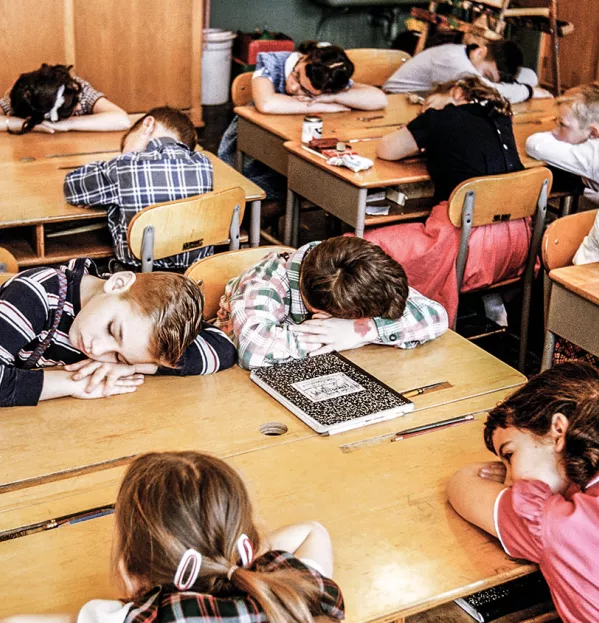‘Rise in home education should be a wake-up call’

Home education is a little-known quantity for most people in Scotland. Even at specialist education conferences, it is rarely referred to, and then only in passing. And yet it is a path taken by thousands of families in Scotland - and it seems that their numbers are growing rapidly.
Alison Preuss (pictured, below right) has for many years been at the forefront of Scotland’s home-education movement, and was struck by the feedback from this community in a new survey. In the past, the prominent factors that persuaded families to choose home education would have included a philosophical objection to school or fears about bullying; but now it seems that the most common driver is additional needs not being met in school.
In an interview with Tes Scotland, Preuss says that it is hard to tell how many home-educated children there are in Scotland. For a number of years, she routinely referred to 5,000-6,000 families, but she believes the figure may have doubled in recent times.
Lack of support
In the new detailed survey of 329 members of the Scottish Home Education Forum (see bit.ly/HomeEdSurvey), most cited disability, chronic illness, unmet support needs - especially for severe anxiety about school and autism - as key factors in their decision to home-educate. Many also highlighted bad experiences of mental health services.
Preuss, a coordinator of the forum, believes that had the survey been carried out 10 to 15 years ago, more than half of the responses would have come from people who had made a “positive choice” to pursue home education, and that those who felt forced into it would have been more likely to cite bullying at school as a factor. “It does now seem more to do with disability-related issues in schools not being dealt with - that is a huge worry and should be a wake-up call to the government,” says Preuss.
Scottish government figures show that 27 per cent of all pupils were classified as having additional support needs (ASN) in 2017, up from 18 per cent in 2012, and Preuss believes schools’ frequently inability to cope is leaving many parents in “desperation”.
The initial aims of Curriculum for Excellence (CfE) that were set out 15 years ago - including promises of more child-led, individualised learning - held much appeal for Preuss, who withdrew her three children from school in the 1990s in frustration at its inability to support quick learners.
However, she now sees a reality far removed from these idealistic aspirations. “[CfE] is kind of doomed to failure, because you can’t really cater for a class of 20-30 children, all with different ideas,” she says. “The government set the [CfE] outcomes, so you’re not actually setting your own goals - it’s somebody else’s interpretation of what you should be doing. That’s not what autonomous education and self-directed learning is all about.”
The increasingly broad expectations of teachers - in an era when health and wellbeing are deemed as important as subject expertise - are “not fair to their professional expertise”, Preuss believes. “You can’t have teachers doing absolutely everything,” she says.
Preuss also harbours deep concerns about national priorities such as early intervention, the Named Person scheme - which would see every child in Scotland assigned a professional, often a teacher, to oversee their “wellbeing” - and the Getting it Right for Every Child (Girfec) policy.
She argues that these are less about improving children’s lot than “micromanaging people’s lives”, and that the focus should instead be on “big structural problems” such as poverty, employment and housing.
She says that the survey reflects an angry “backlash” about the “control freakery” in systems such as Girfec and Named Person, adding: “Schools are keeping these notes on children and family members … it’s really way over the top and amounts to profiling.”
Children’s rights
Preuss, who studied law at the University of Edinburgh, has previously written about the United Nations Convention on the Rights of the Child. She questions the credibility of the “rights-respecting” status that growing numbers of Scottish schools are seeking for promoting children’s rights, because “if you don’t have the right to refuse something, it’s not a right at all”. If children are made to attend school, she adds, those who refuse “end up being sent to the Children’s Reporter”.
For that reason, says Preuss, “a rights-respecting school is basically an oxymoron - there’s no such thing”.
A Scottish government spokeswoman says: “We want all children and young people to receive the support that they need to reach their full potential and to learn in the environment that best suits their needs - and they have a legal right to support with their learning in school if they need it. We encourage local authorities and home-educating parents to work together to develop trust, mutual respect and a positive relationship that functions in the best interests of the child.
“Curriculum for Excellence has been validated as a bold and effective approach by the Organisation for Economic Cooperation and Development and the International Council of Education Advisers. It provides young people with a well-rounded education that prepares them to thrive in today’s world.”
You need a Tes subscription to read this article
Subscribe now to read this article and get other subscriber-only content:
- Unlimited access to all Tes magazine content
- Exclusive subscriber-only stories
- Award-winning email newsletters
Already a subscriber? Log in
You need a subscription to read this article
Subscribe now to read this article and get other subscriber-only content, including:
- Unlimited access to all Tes magazine content
- Exclusive subscriber-only stories
- Award-winning email newsletters